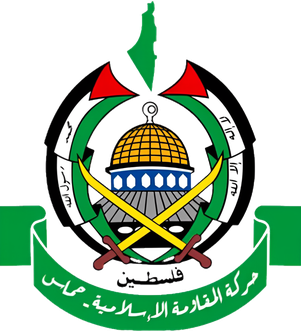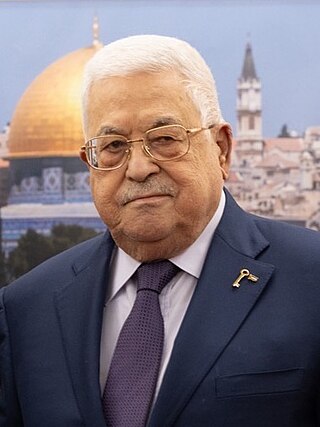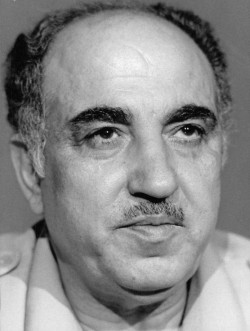Related Research Articles

Fatah, formerly the Palestinian National Liberation Movement, is a Palestinian nationalist and social democratic political party. It is the largest faction of the confederated multi-party Palestine Liberation Organization (PLO) and the second-largest party in the Palestinian Legislative Council (PLC). Mahmoud Abbas, the President of the Palestinian Authority, is the chairman of Fatah.

Hamas, an acronym of its official name, Harakat al-Muqawama al-Islamiya, is a Palestinian Sunni Islamist political and military movement governing parts of the Israeli-occupied Gaza Strip.

The Palestinian National Authority, commonly known as the Palestinian Authority and officially the State of Palestine, is the Fatah-controlled government body that exercises partial civil control over West Bank areas "A" and "B" as a consequence of the 1993–1995 Oslo Accords. The Palestinian Authority controlled the Gaza Strip prior to the Palestinian elections of 2006 and the subsequent Gaza conflict between the Fatah and Hamas parties, when it lost control to Hamas; the PA continues to claim the Gaza Strip, although Hamas exercises de facto control. Since January 2013, the Palestinian Authority has used the name "State of Palestine" on official documents, although the United Nations continues to recognize the Palestinian Liberation Organization (PLO) as the "representative of the Palestinian people".

The Palestine Liberation Organization is a Palestinian nationalist coalition that is internationally recognized as the official representative of the Palestinian people. Founded in 1964, it initially sought to establish an Arab state over the entire territory of the former Mandatory Palestine, advocating the elimination of the State of Israel. However, in 1993, the PLO recognized Israeli sovereignty with the Oslo I Accord, and now only seeks Arab statehood in the Palestinian territories that have been militarily occupied by Israel since the 1967 Arab–Israeli War.

Yasser Arafat was a Palestinian political leader. He was chairman of the Palestine Liberation Organization (PLO) from 1969 to 2004 and president of the Palestinian National Authority (PNA) from 1994 to 2004. Ideologically an Arab nationalist and a socialist, Arafat was a founding member of the Fatah political party, which he led from 1959 until 2004.
The Black September Organization (BSO) was a Palestinian militant organization founded in 1970. Besides other actions, the group was responsible for the assassination of the Jordanian Prime Minister Wasfi Tal, and the Munich massacre, in which eleven Israeli athletes and officials were kidnapped and killed, as well as a West German policeman dying, during the 1972 Summer Olympics in Munich, their most publicized event. These attacks led to the creation or specialization of permanent counter-terrorism forces in many European countries.

Mahmoud Abbas, also known by the kunya Abu Mazen, is the president of the State of Palestine and the Palestinian National Authority (PNA). He has been the chairman of the Palestine Liberation Organization (PLO) since 2004, PNA president since January 2005, and State of Palestine president since May 2005. Abbas is also a member of the Fatah party and was elected chairman in 2009.

Salah Mesbah Khalaf, also known as Abu Iyad, was deputy chief and head of intelligence for the Palestine Liberation Organization and the second most senior official of Fatah after Yasser Arafat.

Khalil Ibrahim al-Wazir was a Palestinian leader and co-founder of the nationalist party Fatah. As a top aide of Palestine Liberation Organization (PLO) Chairman Yasser Arafat, al-Wazir had considerable influence in Fatah's military activities, eventually becoming the commander of Fatah's armed wing al-Assifa.

As-Sa'iqa officially known as Vanguard for the Popular Liberation War - Lightning Forces, is a Palestinian Ba'athist political and military faction created and controlled by Syria. It is linked to the Palestinian branch of the Syrian-led Ba'ath Party, and is a member of the broader Palestine Liberation Organization (PLO), although it is no longer active in the organization. Its Secretary-General is Dr. Mohammed Qeis.

Faruq al-Qaddumi or Farouk al-Kaddoumi, also known by the kunya Abu al-Lutf, was Secretary-General of Fatah until 2009 and Chairman of Fatah's central committee and the Palestine Liberation Organization's political department, operating from Tunisia, in 2004-2009.

Palestinian political violence refers to actions carried out by Palestinians with the intent to achieve political objectives that can involve the use of force, some of which are considered acts of terror, and often carried out in the context of the Israeli–Palestinian conflict and the Israeli occupation. Common objectives of political violence by Palestinian groups include self-determination in and sovereignty over Palestine, or the "liberation of Palestine" and recognition of a Palestinian state, either in place of both Israel and the Palestinian territories, or solely in the Palestinian territories. This includes the objective of ending the Israeli occupation. More limited goals include the release of Palestinian prisoners or the Palestinian right of return.
The Rejectionist Front or Front of the Palestinian Forces Rejecting Solutions of Surrender was a political coalition formed in 1974 by radical Palestinian factions who rejected the Ten Point Program adopted by the Palestine Liberation Organization (PLO) in its 12th Palestinian National Congress (PNC) session.
Hani al Hassan, also known as Abu Tariq and Abu-l-Hasan, was a leader of the Fatah organization in Germany and member of the Palestinian Authority Cabinet and the Palestinian National Council.

Egypt–Palestine relations are the bilateral relations between the Arab Republic of Egypt and the State of Palestine. Egyptian President Gamal Abdel Nasser was a strong supporter of the Palestinian cause and he favored self-determination for the Palestinians. Although the Egyptian government has maintained a good relationship with Israel since the Camp David Accords, most Egyptians strongly resent Israel, and disapprove of the close relationship between the Israeli and Egyptian governments.

The Battle of Gaza was a military conflict between Fatah and Hamas that took place in the Gaza Strip from 10 to 15 June 2007. It was a prominent event in the Fatah–Hamas conflict, centered on the struggle for power after Fatah lost the 2006 Palestinian legislative election. The battle resulted in the dissolution of the unity government and the de facto division of the Palestinian territories into two entities: the West Bank governed by the Palestinian National Authority (PNA), and the Gaza Strip governed by Hamas. Hamas fighters took control of the Gaza Strip, while Fatah officials were either taken as prisoners, executed, or expelled. The Palestinian Centre for Human Rights reported that at least 161 people were killed and more than 700 were wounded during the fighting.

The Palestinian National Covenant or Palestinian National Charter is the covenant or charter of the Palestine Liberation Organization (PLO). The Covenant is an ideological paper, written in the early days of the PLO.

A series of attempts to resolve the hostility between Fatah and Hamas have been made since their 2006–2007 conflict and Hamas' subsequent takeover of the Gaza Strip.

Palestinian nationalism is the national movement of the Palestinian people that espouses self-determination and sovereignty over the region of Palestine. Originally formed in the early 20th century in opposition to Zionism, Palestinian nationalism later internationalized and attached itself to other ideologies; it has thus rejected the occupation of the Palestinian territories by the government of Israel since the 1967 Six-Day War. Palestinian nationalists often draw upon broader political traditions in their ideology, such as Arab socialism and ethnic nationalism in the context of Muslim religious nationalism. Related beliefs have shaped the government of Palestine and continue to do so.
References
- 1 2 3 4 5 "Saftawi, Assad (1935-1993)". PASSIA . Retrieved 1 December 2023.
- 1 2 Jean-Pierre Filiu (2014). Gaza: A History. Translated by John King. Oxford: Oxford University Press. p. 402. ISBN 978-0-19-020189-0.
- 1 2 3 Jean-Pierre Filiu (2012). "The Origins of Hamas: Militant Legacy or Israeli Tool?". Journal of Palestine Studies . 41 (3): 59, 65. doi:10.1525/jps.2012.xli.3.54.
- 1 2 3 4 5 6 7 Charles Richards (21 October 1993). "Obituary: Assad Saftawi". The Independent . Retrieved 1 December 2023.
- 1 2 3 "Murder of PLO Moderate could Ignite Cycle of Violence". St. Louis Post-Dispatch . Associated Press. 22 October 1993. ProQuest 303782117 . Retrieved 1 December 2023.
- ↑ Clyde Haberman (22 October 1993). "P.L.O. Moderate Shot Dead, Raising Fears on Pact". The New York Times . Retrieved 17 December 2023.
- 1 2 Ben Lynfield (21 October 1993). "Arafat associate shot dead in Gaza". United Press International . Jerusalem. Retrieved 1 December 2023.
- ↑ "1 man's peace plan forced to go nowhere". Chicago Tribune . 28 June 1989. ProQuest 282634918 . Retrieved 1 December 2023.
- 1 2 3 David Hoffman (22 October 1993). "Senior PLO leader slain in Gaza Strip". The Washington Post . Gaza. Retrieved 1 December 2023.
- 1 2 3 Said Al Ghazali (1988). "Islamic Movement versus National Liberation". Journal of Palestine Studies . 17 (2): 178. doi:10.2307/2536880. JSTOR 2536880.
- 1 2 3 Beverly Milton-Edwards; Stephen Farrell (2013). Hamas: The Islamic Resistance Movement. Cambridge and Malden, CA: Polity. p. 309. ISBN 978-0-7456-5468-3.
- ↑ "Friend of Arafat Slain". The Roanoke Times . Gaza City. Associated Press. 22 October 1993. p. A6. Retrieved 1 December 2023.
- 1 2 3 Steven Emerson (1993). "Arafat and the Israeli-PLO Accords". The Brown Journal of Foreign Affairs. 1 (1): 114. JSTOR 24589640.
- ↑ Ziad Abu-Amr (1994). "The View from Palestine: In the Wake of the Agreement". Journal of Palestine Studies. 23 (2): 80. doi:10.2307/2538233. JSTOR 2538233.
- ↑ "Israel agrees to release PLO captives". The Guardian . 22 January 1993. p. 14.
- ↑ "Laid to Rest". Newsday . Associated Press. 23 October 1993. ProQuest 278719675 . Retrieved 1 December 2023.